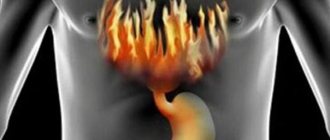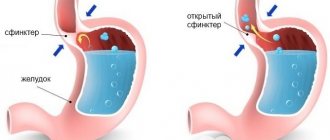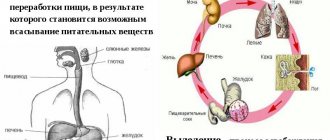2930
November 17, 2016
How to get rid of heartburn during pregnancy in the third trimester. How to treat at home (tips and reviews from moms).
A feeling of unpleasant burning and bitterness in the chest. These are the words most often used to describe heartburn. Pregnant women most often suffer from its spontaneous manifestations (every second pregnant woman complains of heartburn). Moreover, it torments some “lucky” women for the entire 9 months, while for others it “comes” only after 20 weeks.
Causes of heartburn in expectant mothers
In early pregnancy, heartburn is caused by the hormone progesterone. It relaxes smooth muscles. And this leads to the fact that the sphincter between the stomach and esophagus does not close completely. Due to which gastric juice enters the esophagus. And you feel an unpleasant burning sensation in addition to toxicosis.
Often, hormonal changes cause an increase in the acidity of gastric secretions, which aggravates the situation.
In the third trimester, the cause of heartburn is the pressure of the enlarged uterus on the abdominal organs. The stomach moves slightly and its contents may spontaneously enter the esophagus. This often happens when bending over.
Digestion slows down under the influence of hormones. Therefore, heartburn may occur when eating excessively fatty, heavy or spicy foods.
In the later stages, movements or thrusts of the fetus can provoke a “splash” of gastric juice into the esophagus. Discomfort may also occur if a woman lies on her side or wears tight underwear or clothing.
Heartburn is often caused by poor diet and consumption of foods with high acidity.
Causes of discomfort
The problem appears at different stages of pregnancy, causing peculiar sensations. Increasing levels of progesterone, which relaxes the muscles of the gastrointestinal tract and uterus, can provoke heartburn in the first two trimesters.
Food entering the relaxed stomach is thrown back into the esophagus, irritating it and causing a burning sensation. Factors such as:
- stress;
- tight clothes;
- eating disorders;
- taking medications.
In the last months of pregnancy, heartburn can be caused by the increasing size of the fetus, which puts pressure on the internal organs. Severe burning occurs in the following cases:
- large size child;
- polyhydramnios;
- multiple births.
This is a physiological condition of all pregnant women, which disappears after childbirth. The following can cause heartburn at 30 weeks of pregnancy:
- food harmful to the stomach - spicy, smoked, salty or sour;
- overeating – in the final period of pregnancy you should beware of large portions, eating often enough, but in small portions;
- active actions after eating - sudden loads and movements can provoke heartburn;
- drinking soda and alcohol-containing drinks - the aggressive components that make up the liquid are irritating to the stomach;
- eating rich pastries, sour berries and black bread;
- exacerbation of ulcers, gastritis and other gastrointestinal pathologies.
Following simple rules will help you stop the unpleasant condition.
https://youtu.be/VwyLNDThJJY
Signs
Heartburn torments a pregnant woman at 28-40 weeks immediately after eating. Discomfort can last from 5 minutes to several hours. The attacks constantly recur and worsen. Due to night burning, sleep is disturbed. Common symptoms of heartburn during pregnancy:
- frequent belching with a sour or bitter taste in the mouth;
- burning along the entire length of the esophagus;
- pain in the chest area;
- bloating;
- paroxysmal dry cough;
- the woman often feels sick, then vomits.
Each pregnant woman has different severity of these symptoms. This largely depends on adherence to the rules of a healthy diet and moderate physical activity.
How to get rid of heartburn in later stages?
To reduce heartburn during pregnancy, you need to watch your diet.
The Its Kids team recommends:
- eat more stewed or boiled vegetables;
- give up “heavy” meat - lamb, goose, duck;
- eggs, cottage cheese, sour cream are not only rich in protein, but also neutralize acid in gastric secretions;
- Apples, especially green ones, are best eaten baked.
- eating prunes and beets reduces intra-abdominal pressure, as they plasticize the stool.
Another way to get rid of heartburn is to eat small portions, 5-7 times a day. No need to overeat at night.
After eating, experts advise sitting for 30-40 minutes. It is better to sleep with a pillow under your head that raises your head by 10-15 centimeters.
In the first trimester, you do not need to wear tight underwear or exercise your abs - this provokes heartburn.
In the later stages, you should not bend over sharply. To pick up something from the floor or put on shoes, it is better to squat down.
Special sleeping pillows will help you find a comfortable position that will relieve heartburn. They can be bought in maternity stores.
The difficulty of treating heartburn in later stages is that it is impossible to completely eliminate the causes of its occurrence: they will disappear only after childbirth. Another difficulty in dealing with a burning sensation in the abdomen in expectant mothers is the restriction of taking many medications. Many antacid medications that are used to neutralize stomach acid are not recommended for pregnant women.
Is it necessary to treat heartburn, how dangerous is it for the expectant mother and baby? The problem does not have any effect on the fetus and the pregnancy process itself. It also does not cause a negative impact on the mother’s health, unless, of course, she has diseases of the gastrointestinal tract during an exacerbation.
Heartburn only causes severe discomfort that should not be tolerated, so heartburn needs to be treated. If the problem occurs regularly in the second and third trimester, a doctor's consultation is required. He will prescribe the necessary examinations and a course of treatment that will help relieve unpleasant symptoms.
Depending on the cause of the discomfort, the severity of the condition, and your overall health, there are several treatment options. Pregnant women can take certain medications (chewable tablets, sachets or sticks with a creamy product). Traditional medicine recipes, adjustments to diet and lifestyle are widely used. Often, all types of treatment are used in combination for a lasting effect.
Heartburn is one of the most common unpleasant symptoms of pregnancy. Moreover, it is not necessary to have stomach problems for it to appear.
There are many medications that help quickly eliminate these unpleasant symptoms, but not all of them can be used if heartburn occurs during pregnancy.
How to get rid of it, it is better to consult with your doctor, who will tell you about more suitable means that will help.
How to cope with heartburn: medications
Although medications for the treatment of heartburn have few contraindications, not all of them can be used during pregnancy. The table below lists medications approved for use after 28 weeks of gestation, and also provides recommendations on dosage regimens.
Table. Heartburn medications for use after 28 weeks of gestation.
| A drug | How to use | Contraindications | Price |
| "Renny" | Keep 1-2 tablets in your mouth until completely dissolved. Use when symptoms appear. Repeated use is possible after 2 hours. The maximum daily dosage is 11 tablets. | Severe kidney pathologies, increased calcium levels in the blood, calcium deposits in the kidneys. | 170 rubles |
| "Maalox" | 15 ml 3-4 times a day 1-2 hours after meals (one dose should be taken before bedtime). | Hypophosphatemia, severe kidney disease, fructose intolerance. | 161 ruble |
| "Gaviscon" | 2-4 tablets after meals. You can take the drug up to 4 times a day for no longer than 7 days in a row. | Phenylketonuria. | 153 rubles |
| "Iberogast" | 20 drops 3 times a day (with water). | Traumatic brain injuries, inflammation of the gallbladder calculous type, brain diseases. | 564 rubles |
| "Smecta" | 1 sachet (diluted in 60 ml of water) 3 times a day. | Fruit sugar intolerance, intestinal obstruction, glucose-galactose malabsorption syndrome. | 140 rubles |
"Smecta" during pregnancy
Heartburn and nausea during pregnancy in the third trimester
Heartburn in the later stages worries about 50% of all expectant mothers. Why? The human digestive tract consists of certain sections, each of which performs a specific function. At the junction of the esophagus and the stomach there is a sphincter - a special muscular organ, which is designed in a special way: it freely allows everything that flows down the esophagus into the stomach, while keeping the contents of the stomach inside.
However, the sphincter does not always cope with its holding capacity. Sometimes it leaks some acidic stomach contents into the esophagus. In this case, a person experiences a burning sensation and pain in the epigastric region.
The causes of heartburn in expectant mothers in the last trimester are related to hormonal levels. High levels of progesterone lead to decreased muscle tone in the body, causing the sphincter to be unable to retain stomach acid. Additional factors for the occurrence of heartburn in late gestation:
- Large fruit. If the baby is large enough, it takes up a lot of space in the stomach, so the digestive organs are displaced and cannot function normally.
- Polyhydramnios. With an excessive amount of amniotic fluid, the uterus becomes very large and begins to put pressure on other organs and disrupt their functioning. Often, polyhydramnios in the third trimester leads to periodic attacks of nausea, vomiting, and pain in the hypochondrium.
- Multiple pregnancy. In the case of bearing several fetuses, the uterus also becomes very large. This negatively affects the general well-being of the expectant mother and the functioning of her gastrointestinal tract.
What symptoms accompany heartburn?
The burning sensation causes considerable discomfort. In addition to this unpleasant symptom, heartburn is accompanied by other symptoms:
- Pain of varying degrees of intensity. Painful sensations can be either acute or completely insignificant, depending on whether the expectant mother has stomach dysfunction.
- A tickling sensation in the throat. Many people suffering from stomach diseases with increased secretory function complain of pain and burning in the throat.
- Hyperhidrosis. With heartburn, it can be paroxysmal in nature, appearing as the body’s response to pain.
- Bloating and flatulence. Increased gas formation is explained by the high content of stomach acid, which leads to fermentation of the stomach contents, accompanied by the appearance of gas bubbles. In addition to bloating, constipation is often observed with heartburn.
- Heaviness in the stomach. The increased amount of gases in the intestines puts pressure on its walls and creates a feeling of fullness. As a result, the stomach begins to feel very heavy.
- Nausea, bitter-sour taste in the mouth. Since heartburn is caused by excess acid in the stomach, the body tries to get rid of it naturally - by vomiting. If you fail to neutralize the acid, you may vomit. In cases where the amount of acid increases slightly, nausea disappears on its own after a while.
Control methods depending on the causes
We want to live tasty and varied. But you have to pay for gastronomic pleasures with a burning sensation in the sternum, abdominal pain, belching and other discomfort.
To relieve unpleasant symptoms, we buy a heartburn remedy or swallow a little soda.
How to get rid of heartburn quickly, effectively and without consequences? Which drug is the best on the antacid market?
Heartburn is accompanied by a burning sensation in the chest area
Pregnancy is the most joyful and difficult time in the life of every woman. Fortunately and worries for the unborn baby are often mixed with troubles that the expectant mother did not even suspect about before pregnancy. These are dizziness, drowsiness, toxicosis.
But if all these unpleasant symptoms usually disappear after the first trimester, then heartburn can bother you from the first days until the very moment of childbirth. A rare lucky woman has not experienced this terrible feeling of a “bonfire” in the stomach and esophagus. Heartburn often plagues you not only during the day, but also at night; it becomes simply unbearable, greatly poisoning your existence.
https://www.youtube.com/watch?v=jyQeGqEg48Y
What works well for heartburn during pregnancy? You will learn about this by reading the article.
Neutralization of belching at 39 weeks of pregnancy is carried out in several ways:
- taking approved medications;
- compliance with nutritional rules;
- using traditional medicine recipes.
Antacids for heartburn during pregnancy
If such an unpleasant manifestation as heartburn causes a woman significant discomfort, then the doctor may prescribe the use of certain medications, namely:
- Rennie is one of the safest medications that can be taken by pregnant women, regardless of the period. This substance is made on the basis of magnesium and calcium carbonate;
- Almagel is an antacid consisting of aluminum and magnesium. The duration of its action is one and a half hours, which is why the drug will help neutralize moderate heartburn, but is not suitable for long-term use;
- Maalox - a distinctive feature of this medicine is that it can ease the pain that often accompanies heartburn;
- Phosphalugel - in addition to its main effect, it is a sorbent, which is why it is not suitable for long-term use. Side effects include constipation and leaching of substances beneficial to the body from the body;
- Iberogast is a herbal preparation. However, it should be used only when it is impossible to use other medications, because it is available as an alcohol tincture;
- Gestide is one of the few drugs that is suitable for frequent use and is easily tolerated by the body, since it has virtually no side effects;
- Gaviscon.
Such medications are aimed at reducing the acidity of gastric juice. In addition, they envelop the mucous membrane, do not harm the child, since they are not absorbed by the blood, and also do not change the acid-base balance. Despite the fact that such drugs are approved for heartburn at 38 weeks of pregnancy and later, you should not take them on your own.
Milk is an effective remedy for heartburn during pregnancy
- freshly squeezed potato juice;
- milk;
- grated carrots;
- raw pumpkin and sunflower changes;
- medicinal tea based on chamomile and ginger;
- flaxseed jelly;
- aloe juice with honey;
- decoction of heather and fennel;
- thoroughly washed and crushed boiled egg shells;
- centaury and calendula;
- chamomile and mint;
- chopped nuts without peel;
- alkaline waters without gas.
An excellent remedy for heartburn is milk. Even a few sips will relieve discomfort. Teas made from chamomile or fennel flowers also help relieve discomfort.
Raw carrots can help you cope with the problem. During an attack, you need to eat one medium root vegetable. For convenience, it is grated with a tinder.
Etiology
A large number of predisposing factors can cause discomfort and discomfort in the chest, but the main one is disruption of the functioning of the esophageal sphincter. Active intrauterine growth of the fetus leads to stretching of the walls and weakening of the valve muscles. This is due to the growing uterus, which puts pressure on nearby organs, including the stomach, and under the pressure of the uterus, gastric juice has no other way out but to penetrate back into the cavity of the esophagus and irritate the mucous membrane of this organ. It follows from this that heartburn is rather mechanical in nature.
Mechanism of heartburn formation
However, there are several other reasons that lead to the appearance of heartburn in the last period of pregnancy:
- frequent episodes of overeating. Many people mistakenly believe that a pregnant woman should eat a lot, and this is one of the main reasons for the formation of such a sign;
- addiction to junk food, namely too fatty and spicy dishes, as well as smoked meats, sweets and highly salted foods;
- the habit of performing active movements or taking a horizontal body position immediately after eating food;
- drinking large amounts of carbonated drinks or strong coffee during meals;
- wearing excessively tight clothing by a pregnant woman, which compresses not only the fetus, but also the stomach;
- addiction to bad habits, which in itself is extremely harmful to the health of the expectant mother and baby;
- hormonal changes - during pregnancy, a woman’s body produces large amounts of progesterone. This hormone, which is necessary for the full development of the fetus, has a relaxing effect on the sphincter;
- an increase in intra-abdominal pressure - pregnancy, this is one of the few phenomena that can lead to a similar process;
- incorrect or uncomfortable sleeping position;
- the influence of stressful situations, as well as anxiety before future birth;
- taking certain groups of medications. Despite the fact that there are several medications approved for use by women during pregnancy, non-compliance with the dosage and their prolonged use can cause heartburn.
In addition, some gastrointestinal diseases that occur in a chronic form and worsen during pregnancy can cause heartburn in late pregnancy. Among such diseases are duodenal or gastric ulcers, as well as gastritis, regardless of etiology.
What should pregnant women do if heartburn occurs?
Any treatment for heartburn in late pregnancy should begin with measures that are available to any woman. Their implementation does not require excessive effort. There are recommendations that answer the question of how to get rid of heartburn during pregnancy, among them the following should be highlighted:
- Meals should be taken in small portions. The number of meals should increase to seven times. Immediately before going to bed, you should refuse food. Any food eaten must be chewed thoroughly. Under no circumstances should you overeat. And the food itself should only be healthy.
- Taking a horizontal position immediately after eating is not recommended at all.
- You should only sleep on a high pillow and preferably on your left side. However, it is also possible to choose the right side due to the structural features of the body.
- With severe burning sensation in the chest, especially in the last month of pregnancy, dietary nutrition becomes of great importance. Salty and spicy, sour, fatty and fried foods are excluded from the diet. Also, you should not eat black bread or black tea.
- The menu should include both low-fat milk and jelly, as well as ginger.
- No parts of clothing should tighten the pregnant woman's stomach.
- The inclined position should only be short-term. Prolonged stay in this position should be excluded.
- It is recommended to increase the amount of vegetables in the menu, drink a lot of water, compotes (preferably from dried fruits) and herbal tea throughout the day.
After consultation with a gastroenterologist and gynecologist, traditional medicine methods can also be used. After all, even a glass of Borjomi, drunk on an empty stomach, relieves the burning sensation for several hours. You can also use other tips - use low-fat milk or potato juice.
Simple measures will help prevent heartburn at 32-37 weeks of gestation. In order not to suffer from burning pain in the hypochondrium, expectant mothers are advised to follow a drinking and eating regimen, wear comfortable clothes, and lead an active lifestyle if possible.
Heartburn often appears as a result of emotional stress. To prevent it from causing inconvenience, pregnant women are advised to avoid stress and negative emotions. If you maintain positive thinking and do not overeat, digestion will proceed normally, despite physiological changes and hormonal levels.
If heartburn is not caused by pathology, a pregnant woman can cope with the unpleasant sensation on her own. To get rid of discomfort in recent weeks, it is enough to follow general recommendations and take preventive measures. Tips for eliminating or reducing heartburn in the last weeks of pregnancy:
- A nutritious diet with healthy foods.
- Fractional meals in small portions.
- Limit physical activity immediately after a meal.
- Drinking water and other drinks between snacks.
- Wearing loose clothing made from natural fabrics that does not put pressure on the stomach.
- Reduce the use of painkillers like No-Spe. These medications weaken the muscle tissue in the gastrointestinal tract, which makes reflux heartburn worse.
- Rest and sleep on a double pillow.
Preventive measures
It is clear that heartburn in the third trimester of pregnancy is, in principle, a common phenomenon, so a woman can cope with the discomfort on her own. For this, it is quite enough to follow general recommendations and carry out preventive measures. It will not be possible to completely neutralize the unpleasant condition, but it is quite possible to weaken its manifestations.
Here are some examples:
- Increase the amount of fish and protein foods you consume to the maximum. By enriching a woman’s body with fatty acids and iodine elements, they improve the functionality of the cardiovascular system.
- Consuming a small amount of salt with food facilitates the functioning of the kidneys, reducing the load.
- Use buckwheat or oatmeal in your diet more often, alternating them periodically. Oatmeal, cooked in milk and flavored with a small amount of honey, is an excellent enveloping product for the stomach. By reducing acidity, it prevents heartburn.
- The amount of liquid that is drunk per day should be increased to 300 ml for every 10 kg of the pregnant woman’s weight in winter, and 400 ml in summer. It must be remembered that the body needs clean water, without additional impurities.
- Intense heartburn at 32 weeks of pregnancy can be relieved with a large amount of fruits or vegetables, which can be consumed boiled, steamed, baked or fresh.
In addition, you should choose loose clothing that prevents pressure on the abdomen. It is not advisable to go to bed hungry. Before going to bed, it won’t hurt to treat yourself to dairy products.
Medicines
Excessive use of medications is not recommended for pregnant women. In the case of heartburn, you can resort to them when dietary adjustments do not help. Be sure to contact your gynecologist. He will select the necessary drug or refer you to a therapist working in the antenatal clinic. You should not take risks and self-medicate.
It is acceptable to take Rennie from the second trimester of pregnancy for severe heartburn attacks. It will relieve discomfort quickly enough. But the course of treatment should not exceed 7 days. The drug is not recommended in the last weeks of pregnancy.
Maalox can be taken by pregnant women. But the course should not exceed 7-10 days. The drug will relieve an attack in three hours, due to its enveloping and adsorbing properties. Typically, this remedy is used in extreme cases, when the benefits outweigh the possible risks.
Gaviscon is allowed for pregnant women without restrictions. But before taking it, you still need to consult a doctor to clarify the dosage.
Among the acceptable drugs is Talcid. But the course of treatment should not be more than a week.
Fasfolugel is acceptable in the third trimester, but not more than once every seven days.
The following drugs are prohibited:
- Almagel A (Neo).
- Sucralfate,
- Gelusil-Lak,
You should not abuse even approved drugs. Even they have a negative effect on the body of a pregnant woman.
Some drugs, neutralizing high acidity, remove useful substances (calcium, potassium and others). Therefore, you should not combine their intake with a course of special multivitamins. This applies to a greater extent to anthocides.
Medicines containing large amounts of magnesium can harm the unborn baby. And products that gently envelop the walls of the stomach provoke constipation. This problem is already relevant in the later stages, and medications can seriously aggravate it.
If heartburn constantly torments you and neither traditional methods nor medications help, you need to be examined by a gastroenterologist. Since this symptom may indicate the development of a stomach ulcer or cholelithiasis.
General recommendations
To alleviate the condition during pregnancy, you need to completely reconsider your diet and lifestyle. First of all, avoid eating foods that can cause heartburn: smoked, fatty and fried foods. Each meal should consist of a small portion. You should always (20 minutes before meals) drink about 0.5 glasses of clean water. After eating (within an hour) do not drink water at all. It is also necessary to increase the amount of dairy products and plant foods consumed.
In addition, a pregnant woman must constantly monitor her posture, which is especially difficult to do in recent weeks. Being quite large, the fetus puts additional stress on the lumbar region, which causes inconvenience and sometimes problems for the woman. It is necessary to watch your back not only during the day, but also at night, creating comfortable conditions for rest so that your head is always elevated.
How to treat?
Once heartburn has started, drug therapy during pregnancy can be problematic because not all medications can be used. But there is a generally accepted list of medications whose action is aimed at reducing acidity. You can treat a pregnant woman at 7-9 months with the following medications:
- "Rennie" against heartburn and normalizes digestion. Suitable for any period of gestation. Active substances are magnesium and calcium carbonates.
- "Phosphalugel" - to reduce acidity and absorb toxins. The sorbent is a 20% solution of aluminum phosphate. Not recommended for frequent use, as it washes away minerals and causes constipation.
- "Almagel" is an antacid with aluminum and magnesium hydroxide. Intended for frequent use. Valid for no more than 2 hours.
- "Maalox" is an antacid that relieves pain from heartburn.
- "Gestid" is a complex action antacid. Suitable for course therapy, has virtually no side effects.
- "Iberogast" is a herbal medicine for heartburn in the form of an alcohol tincture.
It is taken in extreme cases and when other means are ineffective.











